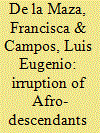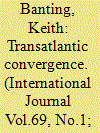| Srl | Item |
| 1 |
ID:
179526


|
|
|
|
|
| Summary/Abstract |
This paper analyses the irruption of Afro-descendants in the sphere of local and national public policies as aresult of their demand for political recognition. Starting in 2000, an Afro-descendant movement developed, positioning itself locally and nationally and obtaining political recognition in 2019 under Law N° 21.151. Incorporating a‘new diversity’ in the design and implementation of public policies as distinct from the indigenous policies that had been implemented for more than 25 years. The paper analyses different levels of state action, relations with other diversities in the implementation of targeted policies (particularly indigenous policies) and the process of Afro-descendant recognition itself. This case shows the difficulties in broadening the social and state vision of cultural diversity and how these are reflected in disputes about the legitimacy of being the ‘original’ peoples as well as for spaces of power and state resources.
|
|
|
|
|
|
|
|
|
|
|
|
|
|
|
|
| 2 |
ID:
129550


|
|
|
|
|
| Publication |
2014.
|
| Summary/Abstract |
At first glance, Canada and Europe seem to be diverging dramatically in their approach to immigrant integration. While support for a multicultural approach seems to remain strong in Canada, a potent backlash pervades European debates. This paper argues that beneath the image of transatlantic divergence, there are important elements of convergence. First, the retreat from multiculturalism in Europe is more complete at the level of discourse than policy. With a few notable exceptions, multicultural policies have remained stable or even grown stronger since 2000. In many countries, new integration programs are being layered over multicultural initiatives introduced in earlier decades. Second, many of the new integration policies celebrated as evidence of a U-turn away from multiculturalism resemble programs that have long been part of immigrant integration in Canada. As a result, transatlantic convergence is indeed part of the contemporary story. However, there are also limits to this convergence. While some European countries are opting for liberal, voluntary approaches to integration, which can be combined with a multicultural approach to diversity, others are adopting more obligatory, illiberal versions of civic integration that seem inconsistent with the support for diversity central to a multicultural approach.
|
|
|
|
|
|
|
|
|
|
|
|
|
|
|
|